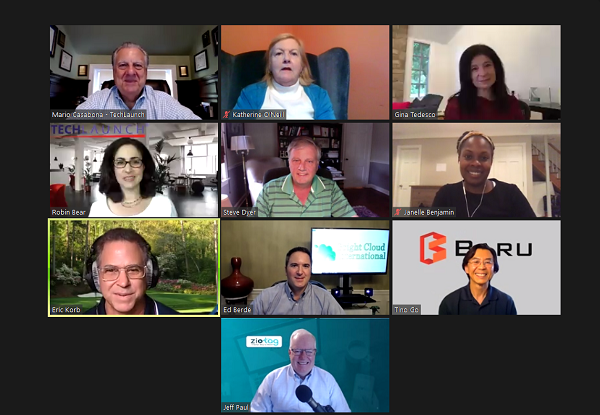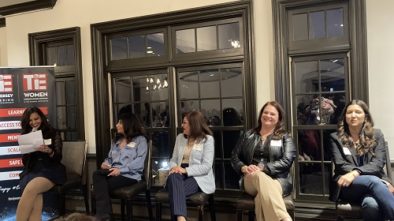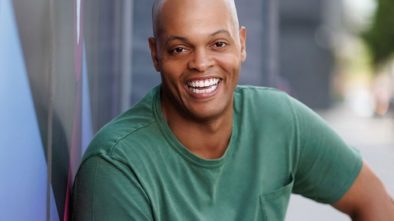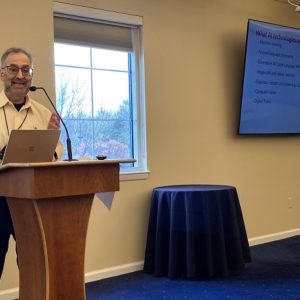NJ-Based Ziotag Wins Virtual TechLaunch BullPen
On July 28, TechLaunch, the New Jersey-based tech business accelerator and mentorship organization founded by Mario Casabona, held its very first virtual BullPen pitch competition, transitioning the event online.
The competition featured three startups vying for $15,000 in advisory services and a chance to pitch in front of Jumpstart New Jersey Angel Network and Newark Venture Partners. Each startup pitched for seven minutes, fielded questions from the audience for seven minutes and then received feedback from the investor panel. A video of the online BullPen, indexed by the winning startup, Ziotag, can be found here.
The investors providing feedback for this group of startups included: Gina Tedesco, board member of the Jumpstart NJ Angel Network, managing director of Golden Seeds (Tedesco leads Golden Seeds Activity in New Jersey) and founder of Amala Ventures; Janelle Benjamin, cofounder and former COO of SuperData (New York), a big data market research company acquired by Nielsen in 2018; Katherine O’Neill, member of the board of the Rowan University Innovation Fund (Glassboro), executive director of the Jumpstart NJ Angel Network and cofounder of Broad Street Angels (Philadelphia); and Stephen Dyer, chairman of Jumpstart NJ Angel Network and managing member of SRD Capital Management (Westfield).
Bright Cloud International
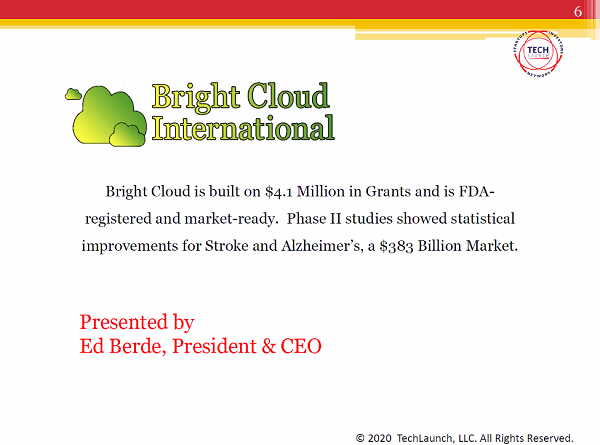
First to present was Ed Berde, CEO of Bright Cloud International (North Brunswick), a rehabilitation-technology company built on $4.1 million in government research grants. His pitch captured the audience choice award. The product is FDA registered and market ready, said Robin Bear, founder of Robin Bear Consulting, an advisory for startups and middle market enterprises, who introduced the company and ran the online meeting. Phase two studies have showed statistical improvements for stroke and Alzheimer’s patients, she said.
Berde said that Bright Cloud is set to disrupt the $383 billion post-acute market for neuromuscular cognitive rehab, “and we’re starting with stroke,” using software and gaming techniques to retrain stroke patients. The company’s technology utilizes AI and machine learning to gauge the patient’s physical and cognitive performance, while measuring critical diagnostic data. In medicine, that data is what’s so important, he said, as it allows Bright Cloud to tailor video games to the patient.
The data is stored in the company’s HIPAA-compliant cloud servers, and the system has built-in reporting. “Physicians can see the result both for individual clinical sessions as well as longitudinally, to track the patient’s long-term progress,” he said. “The clinical sessions are based on virtual reality, not within a headset per se,” although the company does have some studies going on right now using headsets, rather than displays. In any case, the current product is based on virtual reality that’s engaging and presented on a large display, with the patient operating controllers in a 3D space.
Berde came onboard in November to productize the clinical system, so that it could be used in the home. “Our whole system will provide rehab at one-tenth the cost of facility-based care,” he noted. In response to an audience question about the “International” in the company name, Berde said that Grigore Burdea, the researcher behind the Bright Cloud system and the founder of Bright Cloud, is also the founder of the International Society for Virtual Rehabilitation (Highland Park). “So, we look to use that as a conduit into other countries,” he said. In response to some feedback from Tedesco, Berde noted that the company expects to have well over 1,000 units out on the market in its first year of sales.
Baru
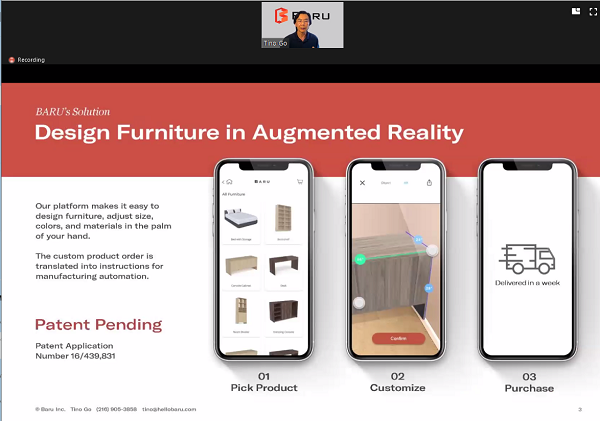
Speaking next was Tino Go, founder and CEO of Baru (New York). “We are a shared economy platform,” Go said of his custom office-furniture company. “Consumers use augmented reality to customize the product they want to buy. Instead of wasting hours shopping, we let consumers customize the designs themselves. That augmented-reality user interface controls the manufacturing process. We’re using the idle woodworking robots [at cabinetmakers] to make the furniture in the customer’s hometown. These idle robots are owned by the custom cabinet makers and in every midsize and larger city. Since we make it in the customer’s hometown, we can deliver the furniture in about a week,” Go told the audience and judges.
The idle robots are so fast, they’re rarely used more than two hours a day by the shop owners. “So, we created a simple user interface that allows those machines to be deployed,” which is a win for the cabinetmaker and the consumer, he said. Also, by manufacturing after the customer buys, the company eliminates the need for inventory.
There were many questions from the audience about the business model and how the funds from a capital raise would be used. Go said that 70 percent of everything the company raises would go to sales and marketing, with website development and administrative costs covered by the rest. Benjamin commented that she understood the concept and liked it. Go had mentioned that Baru had an arrangement with Google in which the latter’s employees who are now working from home could opt for Baru products. She would have liked to learn more about this arrangement.
Ziotag
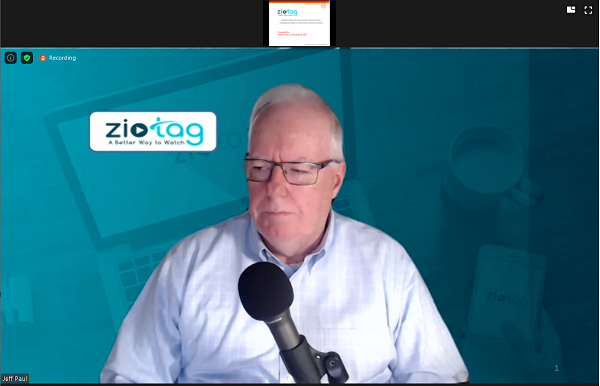
The final presenter, and the winner of the night, was Jeff Paul, cofounder and CEO of Ziotag (Plainfield). Ziotag is a web platform that uses the industry’s first AI powered video player to give viewers a better way to watch online videos. The video player automatically generates a searchable transcript for any video on the internet. And it also automatically creates an actionable table of contents. “That’s important because it makes it much easier for viewers to watch a long-format video and consume it as well.”
Long-format videos are full of great content, but people don’t want to watch the entire video from start to finish just to find that one golden nugget of information that they’re looking for, he said. “You wouldn’t purchase a 400-page textbook or a technical reference manual without a table of contents. Why would you watch an hour-long YouTube video without that?” he asked.
The company’s business model targets the suppliers of long-format videos. The market size for online videos is huge, with digital marketing, podcasts, employee training and recorded Zoom sessions, he said. “Now we can add e-learning and distance learning. Quite frankly, we stopped counting at $350 billion.” Ziotag believes it can get a good piece of that market.
An audience member asked if there were any copyright issues around using Ziotag, and Paul said no, because the company is not touching the videos. “Everything happens around the video,” he said. O’Neill suggested that Ziotag highlight its business model and its accomplishments in its pitch, rather than talk so much about the product. Dyer added that he thought the product had a good market, and he hoped that a media company would see its value.

